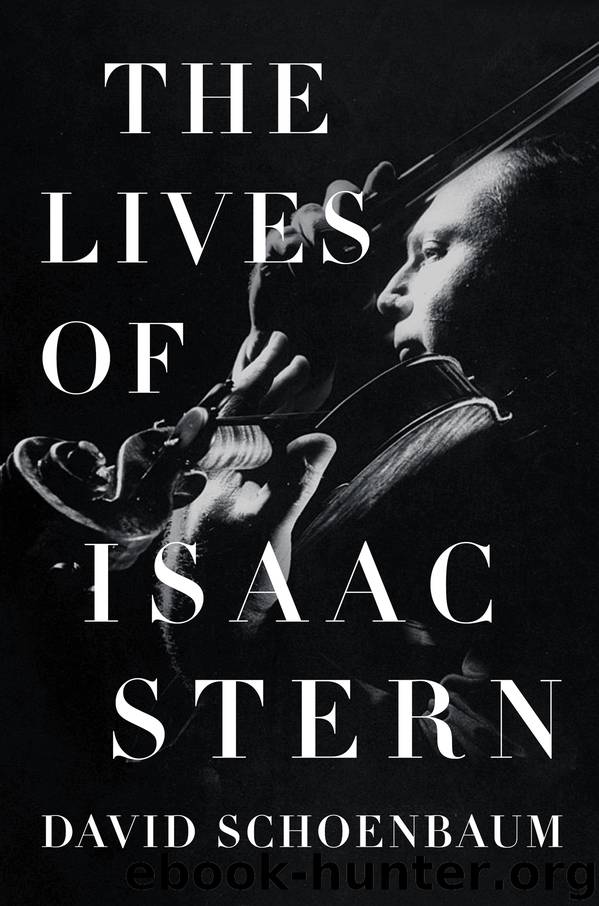The Lives of Isaac Stern by David Schoenbaum

Author:David Schoenbaum
Language: eng
Format: epub
Publisher: W. W. Norton & Company
Published: 2020-04-25T00:00:00+00:00
ISAAC STERN
For thousands of people each week,
the choice to Israel is the airline of Israel
But there can’t have been a lot of readers who failed to connect the dots.
The self-assured informality of Israeli audiences in shorts and khaki shirts, score in hand, immediately enchanted him. Like a visiting foreign minister or a new ambassador, which in a way he was, he was taken to meet the prime minister, David Ben-Gurion, who understandably impressed him. But he was equally impressed by a cab driver, who reminded him to get on with it because he had a concert that evening, and by Paula, the Founding Father’s wife, who asked his impressions of “the old man” as she saw him out.
He remembered a midnight swim in Lake Kinneret with Teddy Kollek, who would become a close friend as well as a formidable mayor of Jerusalem. He also remembered tea, peanuts and conversation with a man “running agents in Lebanon” that followed at 2 A.M. at the house of a friend. In Jaffa, the general assigned to show him around told him war stories and explained his efforts to keep a promising young poet out of harm’s way. The night clerk at a hotel in Tel Aviv that smelled of “urine and carbolic acid” wanted to know why he programmed Beethoven’s Sonata, Op. 24, instead of Op. 96. In Haifa his hosts put him up in a sanitarium to assure that he got an egg for breakfast.
Nearly half a century later, in an appeal to the Seagram billionaire and philanthropist Charles Bronfman for continued support of the master-class project he called Encounters, Stern acknowledged both wistfully and painfully how much had changed since that life-changing first visit. “It is so different from the country I saw radiantly beginning its hopeful life in 1949,” he sighed.
But it was clear from his sessions with Potok that the fading of that radiance had been on his mind since at least 1967, when one of the world’s most spectacular military victories left a legacy of conflicts and dilemmas still unresolved years after Stern himself has left the earthly scene. Moshe Dayan, a native-born child of the first kibbutz as well as a storied military leader, understood the Arabs, he said. Meir, a child of Kiev and Milwaukee, who only recognized black and white, did not.
In 1967–70, as Stern saw it, Israel lost a unique opportunity to make its Arab neighbors an offer they couldn’t refuse by integrating them into its economy, banking system and medical services. “Why didn’t it happen?” Potok asked. “Golda didn’t want it,” Stern replied. Instead, there was another war in 1973. Four years later, a watershed election in 1977 produced a new establishment, likely to wear a tie to concerts in contrast to their socialist predecessors, unlikely to invite Stern for a midnight swim in Lake Kinneret, and very different from the one that he had always known.
Thirty years after his discovery of Israel, it was clear why his remarks at a postconcert reception at the Tel Aviv Museum of Art made an impression.
Download
This site does not store any files on its server. We only index and link to content provided by other sites. Please contact the content providers to delete copyright contents if any and email us, we'll remove relevant links or contents immediately.
| Classical | Country & Folk |
| Heavy Metal | Jazz |
| Pop | Punk |
| Rap & Hip-Hop | Rhythm & Blues |
| Rock |
Cecilia; Or, Memoirs of an Heiress — Volume 3 by Fanny Burney(30929)
Cecilia; Or, Memoirs of an Heiress — Volume 2 by Fanny Burney(30886)
Fanny Burney by Claire Harman(25779)
We're Going to Need More Wine by Gabrielle Union(18067)
Plagued by Fire by Paul Hendrickson(16631)
Cat's cradle by Kurt Vonnegut(13857)
Bombshells: Glamour Girls of a Lifetime by Sullivan Steve(13102)
All the Missing Girls by Megan Miranda(12741)
Leonardo da Vinci by Walter Isaacson(11897)
4 3 2 1: A Novel by Paul Auster(11035)
Adultolescence by Gabbie Hanna(8138)
The remains of the day by Kazuo Ishiguro(7543)
Note to Self by Connor Franta(7023)
Diary of a Player by Brad Paisley(6865)
Giovanni's Room by James Baldwin(5873)
What Does This Button Do? by Bruce Dickinson(5522)
Recovery by Russell Brand(4560)
Born a Crime by Trevor Noah(4508)
The Kite Runner by Khaled Hosseini(4417)
